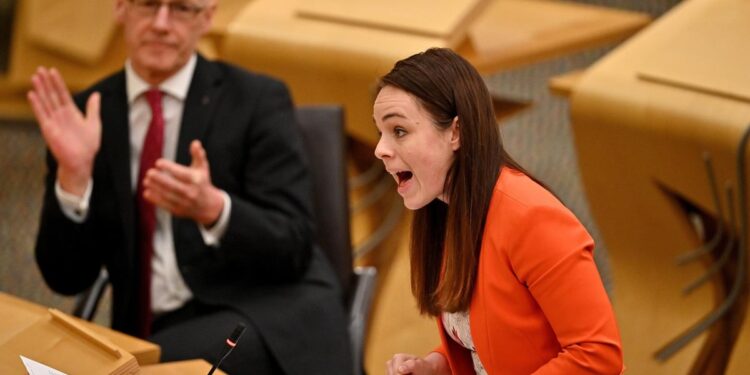Kathleen Stock has written a fascinating piece for UnHerd about the recent attacks on Kate Forbes. Here’s an excerpt:
Lent began this week with a rehearsal for a crucifixion. On Tuesday, SNP leader hopeful and devout Presbyterian Kate Forbes was faced with something she must have known was coming: a challenge from journalists about her views on gay marriage, womanhood, and children being born out of wedlock. She did not flinch from spelling out what she thought. By Ash Wednesday, several of her backers within the SNP had publicly recanted, running scared from the ensuing furore, and Forbes was said to be taking “a break from media commitments”.
Accompanying Forbes’s profession of faith was an apparently sincere endorsement of existing equality law, reiterated on Twitter since. But this complication has been widely ignored in the denunciations that followed. Perhaps unaccustomed to the sight of a principled act of conscience from a Scottish politician, our modern-day Pharisees — otherwise known as newspaper columnists — swung into action to make sure it would not happen again.
As is their wont, several commentators pretended to be taking the room’s temperature while actually turning up the thermostat. In the Times, Alice Thomson warned that if Forbes “can’t step back from the pulpit, she’s in danger of becoming as polarising as Sturgeon”.
Another Times correspondent declared that Forbes was now “fighting for her political career, not just the leadership” — as if there were no room in serious politics at all for someone with Forbes’s views.
The Guardian was yet more forthright. “Pass the idiot pills!” hooted John Crace, punning that the politician was on “a mission” (geddit) “to torpedo her own career”. Over in the New Statesman, progressive clergyman Michael Coren blathered that Forbes shouldn’t “receive a free pass” on her views “because they’re allegedly a product of her faith” — the “allegedly” vaguely implying that her membership of the Free Church of Scotland could be a front for something even worse.
It is common now for Christians in political life to downplay the impact their private beliefs have in their public role. Jacob Rees-Mogg pointed out his views on abortion wouldn’t have any impact on policy, and Kate Forbes has made a similar point about same-sex marriage. Stock, however, makes the argument that such beliefs do have an impact on policy, but that this is welcome in Forbes’s case, given her clear views on the dangerous excesses of the trans rights movement.
Forbes has found her defenders, too: most notably, Kemi Badenoch, who referred to her duty as Equalities Minister to protect religious freedom, arguing that Forbes should be allowed to have “freedom of conscience”. As strategic as this defence from Badenoch is, though, I don’t think it quite works. Individual citizens of course have the right to freedom of conscience — including Forbes, who should be able to think and say whatever she likes within reason. The more pertinent question, though, is whether the religious or philosophical beliefs of a politician are relevant to their suitability for office, and especially when the office in question is leader.
Generally speaking, I don’t see why they aren’t — quite the contrary. The farming industry might reasonably be concerned if a vegan became Secretary of State at Defra. The Equality Act protects the philosophical beliefs of spiritualist psychics, but if a would-be prime minister claimed he could see into the future, voters might worry. And in both cases, the assurance that the beliefs in question were “personal” wouldn’t be much consolation — after all, they are still beliefs, involving a distinctive way of looking at the world that by definition can’t be switched off at will. Where a person appears to be able to leave his personal beliefs at home — as Forbes’ rival Humza Yousaf implies he can with Islam — then arguably, he doesn’t have very strong beliefs in the first place.
Equally, sometimes the personal beliefs of a politician can make them look a lot more attractive to voters. Speaking for myself, I think it’s a promising sign that Forbes is willing to say that the rapist Isla Bryson is a man. It makes her look a whole lot saner in that respect than many of her SNP colleagues. But if that’s the case, it can hardly be a problem in itself that, for others, the very same belief makes her seem like a liability. If legislation in a particular area is still a live question and stands a chance of being influenced by the views of a party leader — as is certainly the case for gender reform law in Scotland — then it’s reasonable to place any would-be leader’s background religious or philosophical beliefs about it under the microscope.
While Stock believes Forbes’s beliefs should be taken into account, she finds the attacks to be largely disingenuous woke posturing:
What we have here is a clash of two religions. One of them is full of sanctimonious, swivel-eyed moral scolds, rooting out heresy and trying to indoctrinate everybody into their fantastic way of thinking. The other is a branch of Calvinism. One of them asks “what would Jesus do?” and the other “what would Owen Jones think?”. Faced with a choice between their representatives on earth, I know which kind I would prefer to see in high office.
Worth reading in full.











To join in with the discussion please make a donation to The Daily Sceptic.
Profanity and abuse will be removed and may lead to a permanent ban.